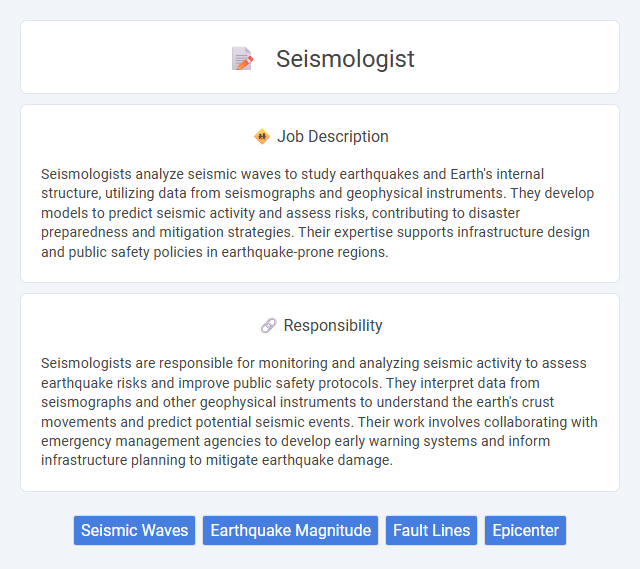
Seismologists analyze seismic waves to study earthquakes and Earth's internal structure, utilizing data from seismographs and geophysical instruments. They develop models to predict seismic activity and assess risks, contributing to disaster preparedness and mitigation strategies. Their expertise supports infrastructure design and public safety policies in earthquake-prone regions.
Individuals with a strong interest in earth sciences and excellent analytical skills are likely to thrive as seismologists. Those comfortable with fieldwork, data interpretation, and extended periods of research may find this role particularly suitable. People who prefer routine tasks or minimal physical activity might face challenges in adapting to the demands of this career.
Qualification
Seismologists typically hold advanced degrees in geology, geophysics, or earth sciences, with many possessing a master's or doctoral degree specializing in seismic research. Proficiency in using seismographic equipment, data analysis software, and strong mathematical skills are essential for interpreting seismic data and modeling earth vibrations. Certification from professional geoscience organizations and experience in fieldwork or research enhance a seismologist's qualifications and career prospects.
Responsibility
Seismologists are responsible for monitoring and analyzing seismic activity to assess earthquake risks and improve public safety protocols. They interpret data from seismographs and other geophysical instruments to understand the earth's crust movements and predict potential seismic events. Their work involves collaborating with emergency management agencies to develop early warning systems and inform infrastructure planning to mitigate earthquake damage.
Benefit
Seismologists benefit from contributing to public safety by improving earthquake prediction and mitigation strategies, which can significantly reduce damage and loss of life. They often have access to cutting-edge technology and research funding, enhancing career growth and scientific discovery. There is likely a strong demand for their expertise in government agencies, academia, and environmental consulting, providing stable and rewarding job opportunities.
Challenge
The seismologist job likely involves interpreting complex seismic data to understand the Earth's internal processes, presenting a constant challenge due to the unpredictability of seismic events. This role probably demands advanced analytical skills and the ability to work under pressure during natural disasters. Handling sophisticated technology and collaborating with interdisciplinary teams might also be essential aspects that contribute to the complexity of the job.
Career Advancement
Seismologists can advance their careers by specializing in earthquake hazard assessment, geophysical research, or seismic data analysis, often gaining expertise in advanced software and instrumentation. Pursuing higher education such as a master's or doctoral degree enhances opportunities for leadership roles in academia, government agencies like the USGS, or private sector companies focused on earthquake risk mitigation. Professional development through certifications and collaboration on international seismic monitoring projects also boosts career growth and industry recognition.
Key Terms
Seismic Waves
Seismologists analyze seismic waves to understand Earth's internal structure and locate earthquake epicenters, using data from instruments like seismographs. They study P-waves, S-waves, and surface waves to interpret fault activity and predict seismic hazards. Expertise in wave propagation and ground motion modeling supports earthquake preparedness and infrastructure resilience.
Earthquake Magnitude
Seismologists analyze earthquake magnitude to assess the energy released during seismic events, using scales like the Richter and Moment Magnitude scales for precise measurement. Understanding earthquake magnitude helps in evaluating potential damage and guiding emergency response efforts. Advanced tools such as seismographs and computer modeling enhance the accuracy of magnitude calculations and contribute to seismic hazard assessment.
Fault Lines
Seismologists specialize in studying fault lines to understand the dynamics of Earth's tectonic plates and predict earthquake activity. Utilizing seismic data, they analyze stress accumulation and slip rates along faults to assess seismic hazards accurately. Their expertise is crucial for developing early warning systems and informing infrastructure safety regulations in earthquake-prone regions.
Epicenter
Seismologists analyze seismic waves to accurately determine earthquake epicenters, which are crucial for understanding the origin and intensity of seismic events. Precise epicenter location data helps in assessing damage patterns, guiding emergency response efforts, and improving earthquake prediction models. Advanced techniques such as triangulation of seismic signals from multiple stations enhance the accuracy of epicenter identification.
 kuljobs.com
kuljobs.com